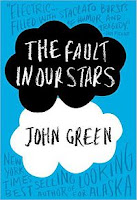Author: John Green
Genre: Young Adult, Tragicomedy
Rating: A
"The fault, dear Brutus, is not in our stars, / But in ourselves, that we are underlings."
This book should come with a warning label. When you read the first couple pages or the back of the cover it makes you think that it's going to be this dark comedy about kids with cancer. Maybe even a bit romantic, but not overly depressing. It has a very "I'm a normal person despite my cancer" feel to it at first - I mean, heck, protagonist Hazel Grace Lancaster complains about missing an America's Next Top Model marathon in order to go to her support group in almost the first chapter (possibly even the first chapter). This book sucks you in and makes you think it's going to be light and funny and dark, only to completely fuck with you. The Fault in Our Stars should come with a warning label, so here it is: this is a book about kids with cancer. Books about kids with cancer are dark and depressing, no matter how light and humourous they might present themselves.
Hazel Grace Lancaster is a girl with cancer. She is sixteen and has been living with it for a long time now - and will continue to do so thanks to this magic, fictional drug that she's on. Weekly her parents force her to go to a support group for kids with cancer, where she meets the handsome and charming Augustus Waters. Gus is seventeen, in remission, and very smitten with Hazel. This is the story of them, and it you think it's going to end badly you'd be right.
There is a lot to Fault, at least in terms of the bask plot, that is predictable. You know they're going to fall in love, you know it's going to end tragically. I mean, the book is about kids with cancer and is named from a Shakespearean quote. There's no other way it could end. There's still mystery though - I spent half the book trying to guess which one of them would die, or if it would be both, or if it would be one and one of their friends, or a whole splatter of kids with cancer dying, or if one of the non-cancerous characters would die, or what. The boon itself isn't overly postmodern, but Hazel and Gus spend a lot of time discussing a book that, based on their descriptions, is postmodern, making you wonder if perhaps Fault is going to end like the fictional book within it - that is just stop mid sentence. I'm not going to tell you if it does or not, I'll let you suffer.
Despite being about kids this book is very adult. It meshes the adult world that its heroes have been forced into with the teenage world that they're clinging to amazingly well - alongside discussions of postmodernism and life and death they're also playing video games and reading ridiculous video game based novels and lamenting about heartbreak in a way that only teenagers can do. This is a depressing book, but it's also a light and funny one. It's complicated, but it's also very light.
A friend and I have this habit, however unintentionally, of recommending to each other the saddest and most depressing books that we've read. When I finished reading Fault and had wiped my tears away I instantly thought that I had to lend this book to her. If I spent half of it trying to guess what was going to happen and how it was going to end I spent the other half balling my eyes out. By the final chapters I was a mess of tears and snot, but I didn't want to put the book down long enough to blow m nose and dry my eyes because I had to know what was going to happen next. This book completely took hold of me and made my heart wrench. I felt as though I knew Hazel and August and had grown deeply attached to them. And really, that's exactly what a boom should be like.
Just a side note, the quote at the top if the page is from Act 1, Scene 2 of Julius Caesar, and is where Green got the title for the novel.


No comments:
Post a Comment